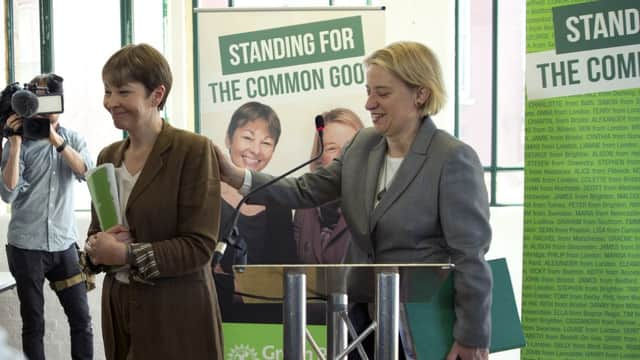Green Party demands end to austerity in manifesto


The leader of the party in England and Wales Natalie Bennett and the party’s only MP Caroline Lucas called for a “peaceful political revolution” as they set out manifesto plans to create a “fair economy” run for the many and not the few.
Ms Bennett said: “It sees the end of the disastrous policy of austerity that is making the poor, the disadvantaged and the young pay for the greed and the fraud of the bankers.”
Advertisement
Hide AdAdvertisement
Hide AdOn more traditional ground for the party, Ms Lucas set out £45 billion-worth of plans to tackle climate change, saying the environmental crisis was not “some luxury that is only possible when there are good economic times”.
On the economy, the Green plans to create jobs would be met by ramping up spending by £177bn a year on health, social care, transport, social housing, energy and public works, leaving total spending 20 per cent higher in 2019 than this year.
It would be paid for by a 2 per cent wealth tax on “the 1 per cent” with assets in excess of £3 million, which the party admitted would lead to drastically lower taxes for those just under the £3m threshold.
Under plans described as an “estimation”, the wealth tax would raise £25bn a year. A “Robin Hood tax” on financial transactions would raise £20bn a year.
The Greens also pledged to bring in at least five times as much from tax avoiders than the main parties, at £30bn a year.
The party said it could achieve this because it had more political will than the main parties to do so.
A income tax rate of 60 per cent would be introduced for executives and others earning more than £150,000, while workers would benefit from a 35-hour working week.
The Greens reiterated their openness to supporting a minority Labour government on a case-by-case basis, hinting they could pressure Ed Miliband over Trident, the NHS, education and public ownership of the railways, if they win any seats.
Advertisement
Hide AdAdvertisement
Hide AdThere was a commitment to scrapping university tuition fees and cancelling student debt, renationalising the railways, and blocking privatisation in the NHS.
On housing there was a commitment to provide 500,000 new homes by 2020 with councils free to borrow money to build, ending Right to Buy, and increasing the social housing budget by £4.5bn a year by abolishing “landlord perks” such as mortgage interest relief.
Ms Bennett said the Greens would not build any new major roads as Britain had reached “peak car”, to pay for a 10 per cent drop in public transport fares and other measures to boost walking and cycling.
The party will vote against HS2 in the next parliament.
Transport formed part of the wider environmental strategy, with Ms Lucas announcing a free nationwide retrofit insulation plan for nine million homes, which she said would create 100,000 jobs.
The Brighton Pavilion MP also insisted the Greens could meet their spending pledges on the environment.
At the manifesto launch, she said: “We would invest around £45bn over the course of the parliament and that could be paid for by using some of the £12bn a year that we raise by increasing corporation tax or we could redirect some of the government’s current £100 billion infrastructure budget.”
FOLLOW US
SCOTSMAN TABLET AND MOBILE APPS